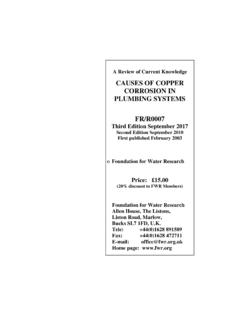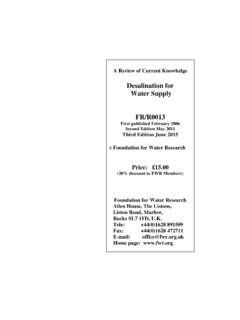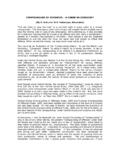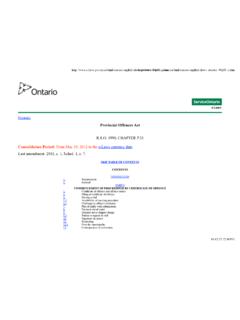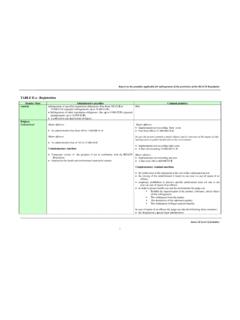Transcription of Civil sanctions for environmental offences - FWR …
1 Civil sanctions for environmental offences The environmental Civil sanctions Order & Regulations 2010 Guidance to regulators in England on how the Civil sanctions should be applied, and draft guidance for Wales* January 2010 *Legislation is likely to be made in Wales during 2010. This document remains in draft for application in Wales until it has been updated to reflect the planned Welsh legislation. Guidance to regulators on Civil sanctions for environmental offences 1 Department for Environment, Food and Rural Affairs Nobel House 17 Smith Square London SW1P 3JR Telephone 020 7238 6000 Website: Crown copyright 2009 Copyright in the typographical arrangement and design rests with the Crown. This publication (excluding the royal arms and departmental logos) may be re-used free of charge in any format or medium provided that it is re-used accurately and not used in a misleading context.
2 The material must be acknowledged as crown copyright and the title of the publication specified. Information about this publication and further copies are available from: Defra Fairer and Better environmental Enforcement team 5A, Ergon House Horseferry Road London SW1P 2AL Tel: 0207 238 6148 Email: This document is available on the Defra website: Published by the Department for Environment, Food and Rural Affairs Guidance to regulators on Civil sanctions for environmental offences 2 Contents 1. Introduction .. 3 Civil sanctions for environmental offences .. 3 Background and objectives of Civil sanctions .. 4 About this document .. 5 2. Using Civil sanctions .. 8 General approach to using Civil sanctions .. 8 Existing enforcement mechanisms .. 11 Compliance notices, restoration notices and variable monetary penalties .. 12 Enforcement undertakings.
3 26 Fixed Monetary Penalties .. 29 Stop notices .. 32 Publicity .. 34 3. Factors determining enforcement approach .. 36 Advice and guidance .. 36 Prosecution .. 36 4. Enforcing Civil sanctions .. 40 5. Costs .. 42 6. Representations and appeals .. 43 Annex 1: offences covered by Civil sanctions .. 46 Table 1. List of offences and the Civil sanctions that are available for them as legislated by the environmental Civil sanctions (England) Order 2010 .. 46 Table 2. List of offences and the Civil sanctions that are available for them as legislated by the environmental Civil sanctions (Miscellaneous Amendments) (England) Regulations 2010 .. 50 Annex 2: Scenarios to illustrate using Civil and other sanctions .. 54 Annex 3: Monitoring the Civil sanctions .. 57 Annex 4: Glossary .. 59 Annex 5: Contact information .. 62 Guidance to regulators on Civil sanctions for environmental offences 3 1.
4 Introduction Civil sanctions for environmental offences The Government, including the Welsh Assembly Government, believes that environmental regulators should have access to effective sanctions that are flexible and proportionate and that ensure the protection of the environment and human health when tackling non-compliance. The new Civil sanctions will allow regulators to distinguish more effectively between those with a good general approach to compliance and those who tend to disregard the law. They will enable regulators to respond appropriately to the circumstances of each case; for example, ensuring that those who have saved costs through non-compliance do not gain an unfair advantage over those who have complied. This represents an important change in the way that enforcement is conducted and is expected to foster improved communication and co-operation between regulators and those they regulate.
5 The Civil sanctions include: Compliance notice: A requirement to take specified steps within a stated period to secure that an offence does not continue or happen again. Restoration notice: A requirement to take specified steps within a stated period to secure that the position is, so far as possible, restored to what it would have been if no offence had been committed. Enforcement undertaking: These enable a person, which a regulator reasonably suspects of having committed an offence, to give an undertaking to a regulator to take one or more corrective actions set out in the undertaking. Fixed monetary penalty (FMP): A requirement to pay a monetary penalty of a fixed amount. Variable monetary penalty (VMP): A requirement to pay a monetary penalty of an amount determined by the regulator reflecting the circumstances of the offence. Third party undertaking: These enable a person who has received a regulator s notice of intent to impose a variable monetary penalty, for example, to give a commitment to take action to benefit a third party affected by the non-compliance.
6 Stop notice: A requirement for a person to stop carrying on an activity described in the notice until it has taken steps to come back into compliance Guidance to regulators on Civil sanctions for environmental offences 4 The Regulatory Enforcement and sanctions Act 20081 (hereafter RES Act) contains enabling powers to introduce these Civil sanctions across a number of different spheres. In the environmental sphere Civil sanctions are introduced by the following Statutory Instruments2: The environmental Civil sanctions (England) Order 2010 The environmental sanctions (Miscellaneous Amendments) (England) Regulations 2010 The draft proposed environmental Civil sanctions (Wales) Order 2010 The draft proposed environmental sanctions (Miscellaneous Amendments) (Wales) Regulations 2010 These Statutory Instruments make the Civil sanctions available for certain specified offences for use by: The Environment Agency Natural England The Government plans to consider possible proposals to make Civil sanctions available for use by Local Authorities.
7 Following the joint Defra/WAG public consultation which ended on 14 October 2009, the Welsh Assembly Government is also considering whether to introduce Civil sanctions for use by Countryside Council for Wales. In using the Civil sanctions regulators must apply a criminal standard of proof: they must be satisfied beyond reasonable doubt that an offence has been committed before using them, except for enforcement undertakings and stop notices (see paragraph ). Background and objectives of Civil sanctions The Macrory Review of regulatory enforcement3 and a Defra review of environmental enforcement4 both concluded that the current sanctioning framework for dealing with environmental offences was capable of improvement. The problems identified were that: Regulators often have to choose between issuing a warning letter or caution and taking criminal proceedings without easy access to proportionate intermediate sanctions that act as a deterrent, leading to a compliance deficit The current enforcement system therefore relies heavily on criminal sanctions and this is sometimes disproportionate 1 The RES Act does not cover offences created in legislation that is made under the European Communities Act 1972; the European Communities Act is therefore to be used to introduce RES style Civil sanctions in regulations that implement requirements of EU Directives.
8 2 The RES Act only allows Civil sanctions for existing offences . Therefore, new legislation will consider the potential for using Civil sanctions separately. 3 Regulatory Justice: Making sanctions Effective. 4 Guidance to regulators on Civil sanctions for environmental offences 5 Fines do not always cover the costs to society of harm from non-compliance and therefore do not always act as an appropriate deterrent, contributing to a shortfall in compliance environmental damage and its effects are often not put right Overall, the current system does not adequately encourage or take account of a generally good approach to compliance, or deter non-compliance, with environmental regulations. Potentially it gives those who do not comply with regulations a competitive advantage which is unfair to those who do comply. In response to these shortcomings the Government has introduced RES Act Civil sanctions for environmental offences .
9 The regulators still have the discretion to use existing sanctioning powers and any of the other approaches to enforcement that pre-dated RES Act Civil sanctions and they will decide what is appropriate on consideration of the specific facts of the case. Advice and guidance remains the cornerstone of a well graduated system of enforcement and will in many cases be sufficient to achieve the regulators enforcement objectives. Regulators will use the new sanctions when more appropriate to achieving enforcement objectives and proportionate than relying on existing enforcement mechanisms. Prosecution remains the appropriate response for the most serious offences . The Government also has plans to introduce new powers to assist the courts in structured, proportionate, and effective sentencing of the especially serious environmental offences that continue to come before them.
10 The aim of these measures is to create a better graduated enforcement system and, more widely, a level playing field in removing competitive advantages for non-compliant companies and to be fairer overall. The introduction of these measures should lead to wider benefits for the protection of the environment. About this document This document is non-statutory guidance which sets out how the Secretary of State for the Environment, Food and Rural Affairs and, in draft form, the Welsh Assembly Government consider these Civil sanctions should be applied in practice. It sets out government policy and is intended to make clear that there is a fair process for the Civil sanctions and to ensure consistency across regulators. The RES Act5 requires regulators to consult on and publish guidance about the new sanctions ( sanctions Guidance ) as well as how they will enforce offences ( Enforcement Policy ).

